Smart sensor provides peace-of-mind to those caring for someone with dementia
Caring for someone with dementia can be a difficult task, leaving the house, doing the shopping or attending appointments can be stressful for carers, placing themselves and the person they're caring for at risk of an number of outdoor hazards and distractions.
People living with dementia can often experience problems with orientation and encounter sensory difficulties, alongside the more common symptoms of memory loss and confusion, opting to repeatedly walk around or try to leave the house at any time of day or night.
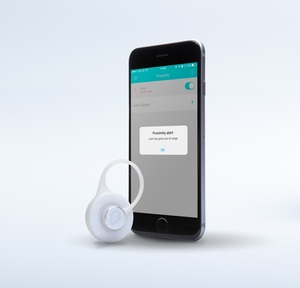
Smart sensor Proximity, is one of the latest innovations designed to support people living with dementia and their carers by sending alerts to an associated smartphone to warn when a loved one has ‘wandered’.
Founder of Proximity, Natalie Price said: “My mum’s cared for people with dementia for over 15 years. It’s her experiences and stories that highlighted the issues carers can face, one of the scariest being wandering. It is extremely stressful for the carer, not to mention dangerous for the person with dementia. It was this that inspired me to create an affordable and simple solution that would help. It was her stories that made me realise just what a big problem wandering is.”
Walking or 'wandering' affects nearly two-thirds of people living with dementia and can put both them and those around them at risk. Furthermore, it can cause stress for their loved ones or carer as there is a risk of that person unwittingly placing themselves in danger.
An affordable solution
Unlike other similar products on the market, the sensor is not a tracking devices and does not rely on GPS technology. The sensor uses a Bluetooth beacon to alert carers via a smartphone app whenever the person wearing the sensor moves a certain distance away from the phone.

The small, wearable magnetic badge is currently being crowdfunded on Indiegogo and will retail for around £40-45, combined with a free app to download for Apple and Android devices.
Natalie continued: "Proximity is unlike anything else on the market because it uses different technology to provide a simple and affordable option for carers. Proximity uses Bluetooth technology to act as a warning device. Proximity is not a tracking device.
“We’ve done some testing with my mum’s Alzheimer’s group on a number of occasions and had great success.
“If you are in a larger open space, the person will get to approximately 20 metres before the phone alarms. If you are in a more confined, busy space such as a shopping centre it will go off sooner as walls and people will block the signal sooner."
More human-centric care
A recent study by healthcare networking organisation, the South East Health Technologies Alliance (SEHTA), highlighted the potential of technology to free-up staff time and provide more human-centric care.
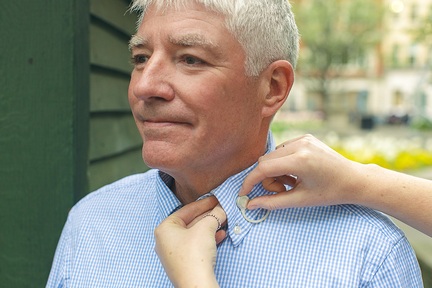
In their report, SEHTA praised the level of innovation currently available to support the delivery of quality care in the UK, however recognised that there is still a lack of uptake across the UK care sector.
SEHTA’s report identified smart innovations, including smart sensors and alerting devices as a way to improve the lives of care workers and carers.
Natalie works as a producer for a digital marketing agency, it was here where the project began. She said: “In 2014 the agency held a Dragon’s Den style competition in which they would invest time and money into an idea that they believed in. I won that competition and this allowed me to get to proof of concept and where I am today.
“We first started 18 months ago. During this time, we’ve been testing various types of wearables such as bracelets, pendants and the badge. User testing showed the badge to be the most suitable as once on the wearer they forgot it was there. We then developed the attachment of the badge. The magnet was our chosen design as it’s very secure and also means it can be worn on almost all types of clothing. We’ve also been developing our app, ensuring that it’s user-friendly for people of all ages.”
Making the lives of carers easier
There are more than 850,000 people living with dementia in the UK today, the equivalent of 1.3 per cent of the current population and 46.8 million people worldwide.
Dementia is increasingly common in UK care homes with 80 per cent of care home residents living with condition and one in six people over the age of 80 living with dementia nationwide.
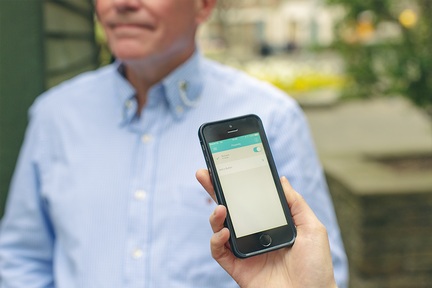
Recognising the potential of assistive technologies head of policy and public affairs at Alzheimer's Society, George McNamara stressed that assistive technology should be ‘carefully considered’ and not replace human contact. He said: “Although assistive technology has the potential to enhance quality of life for people with dementia, it needs to be carefully considered so that its use is always in the best interest of the person with dementia.
“As health and care services continue to feel the strain, it is crucial that assisted technology is not used as a shortcut in replacing human contact. Rather, it should enhance social interaction for people with dementia alongside high quality, consistent care and support.”
There is growing support for the use of technology to support the delivery of care, freeing up staff time and improving the well-being and independence of service users. In January 2016, The Kings Fund published an article of the top eight technologies set to revolutionise health and care, putting smartphones and smart assistive technology near the top of the list.
Safeguarding and security
Many of the currently available assistive technologies are being used by people with dementia, living in their own homes, helping to support them with safeguarding and offering additional security.
In 2013, the University of Stirling conducted a review on the ‘cost-effectiveness of assistive technology in supporting people with dementia’, study authors revealed that 71 per cent of technologies were being used by people living with dementia in their own homes, compared to just 27 per cent in residential care settings. The majority of the technologies were home based monitoring and surveillance systems.
Explaining why Proximity does not use a GPS signal, Natalie said: "Whilst GPS tracking devices are a great solution to help with wandering, they aren’t suitable for everyone; they’re expensive to purchase and they then incur monthly subscription fees. The Proximity Button is much more affordable and has no on-going fee. Proximity is an alternative solution to one of the biggest problems a dementia carer will face.
“Once you add location services it really increases the price of the product. We wanted to keep our product as simple as possible. If the person in your care is wearing the button and they wander you will know about it far quicker than if they weren’t."
Watch Natalie Price talking about Proximity below.
Natalie added: “The next product we would like to focus on is something for those who still live independently. Not everyone lives with their family, but the family may still worry about their safety and whereabouts. We will develop a low-cost and effective solution that will update family members automatically.
“We’re still in our crowdfunding stage, so far we’ve achieved almost half of our target and we still have a month to go. Once this is complete we will be focussing on the production of the buttons and getting them to our new customers. People can pre-order the buttons on the crowdfunding campaign for a discounted price and they will then be the first to get them.”
For information on Proximity, visit: www.proximitycare.co.uk/ or to donate to the Indiegogo campaign or pre-order a button, visit: www.indiegogo.com/projects/proximity-alerts-you-when-a-loved-one-wanders-off#
Latest Innovative Care News
 13-May-19
'Pink drink' brain cancer treatment rolled out across NHS in memory of Baroness Jowell
13-May-19
'Pink drink' brain cancer treatment rolled out across NHS in memory of Baroness Jowell
 25-Apr-19
Louis Tomlinson helps 83-year-old who lost wife to dementia complete bucket list
25-Apr-19
Louis Tomlinson helps 83-year-old who lost wife to dementia complete bucket list
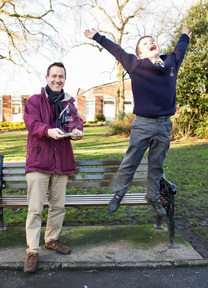 05-Mar-19
Care worker of the year inspires nine-year-old son to work in care
05-Mar-19
Care worker of the year inspires nine-year-old son to work in care
 12-Feb-19
Michael McIntyre's jokes tested to see if they stop elderly catching flu
12-Feb-19
Michael McIntyre's jokes tested to see if they stop elderly catching flu
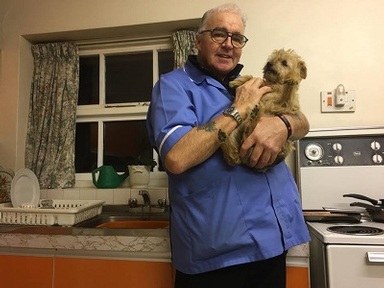 25-Jan-19
Ninety-year-old and his dog can stay together, thanks to care worker
25-Jan-19
Ninety-year-old and his dog can stay together, thanks to care worker